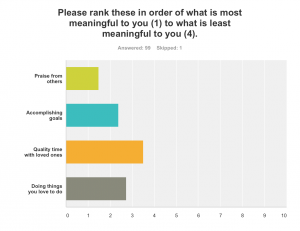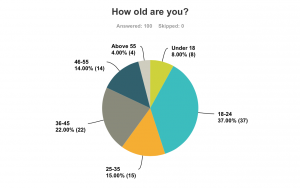We can talk to you all day about different views philosophers have on happiness and meaning, but is this really relatable? Sure, we have the common denominator that we are all living lives here on Earth, but these philosophers we’re talking to you about have spent countless hours thinking about and analyzing this topic of happiness. We’re not trying to disprove the value of the work these individuals have produced, as they give us a great baseline to form our own thoughts and feelings on, but learning the ideas others like us (who have not spent so much time thinking about this material) have about happiness and meaning could be very interesting.
It is this thought process that led us to distribute a survey asking random people questions about happiness and meaning with some regard to religion. Now you’re probably wondering why religion suddenly popped up. We included questions on religion, because we thought there might be a positive correlation between religion and happiness, and we wanted to see if we were correct with this assumption.
The survey was given through SurveyMonkey.com. It was composed of 10 questions (8 multiple choice and 2 ranking questions). We had 100 respondents.
The first question we asked was about age. We wanted to get an idea of who we were talking to about this topic. As you can see from the chart below, the majority of the respondents (37%) were aged 18-24, with the next highest portion (22%) being between 36 and 45.
We then asked everyone what their gender was, and these results were surprising. A whopping 78% of the people who took the survey were female! We’re not really sure why this happened, but it’s good to keep in mind that most of these responses are from women. We’d be interested to see how the results would look if most of the responses were from men.
Like we mentioned before, we wanted to look at religion in relation to these questions, so we asked a baseline question of whether the individuals we were surveying were religious or not. The majority (61%) were religious. Only 17% of people said they weren’t religious, leaving 22% somewhere in between. It would be interesting to note the individual religions of each respondent in relation to their answers to questions, but we wanted to keep the survey relatively simple.
We wanted to delve a little deeper than just asking whether people were religious or not, so we asked a follow-up question: “Would you say your religious affiliations (or lack thereof) are a large part of your personal identity?” 61% of people responded “yes” to this question, which is interesting considering the fact that 61% of people also answered “yes” when asked if they were religious. This similarity led us to look at the individual responses people gave, and the majority of the people who answered “yes” to the first question also answered “yes” to the second, which leads us to assume that those (in this study) who consider themselves religious believe this to largely identify them as individuals.
In an attempt to gather an idea of what people were talking about when they referred to activities that make them happy, we asked a question with four options that respondents were to rank in order of what made them the happiest (1) to what made them the least happy (4). Most people ranked “spending time with family” as what made them the happiest. This was followed by “leisure activities” which was then followed by “religious activities”. “School or work” was ranked the lowest by most respondents. These results did not do much in supporting our hypothesis that religion and happiness are positively correlated, but it did give us insight to the fact that most people care about relationships over accomplishments (family and friends matter more than work).
We also wanted an idea of what people valued as meaningful in their lives, so we asked another question like the previous one. Respondents were again asked to rank from 1-4 what was most meaningful to them to what was least meaningful to them. Most respondents ranked “quality time with loved ones” as the most meaningful, which makes sense considering “spending time with family and friends” was ranked highest previously. Next came “doing things you love to do” which corresponds with “leisure activities”. “Accomplishing goals” was ranked third, and “praise from others” was ranked fourth. It seems that most people can find both meaning and happiness in similar activities.
After we asked the two ranking questions, we assumed respondents would then have some sort of basis on which to decide which was more important to them between meaning and happiness. Two-thirds of respondents chose “happiness” as more important to them, while the remaining third of respondents chose “meaning” as more important.
We wanted to focus again on the religion aspect of our study in the following question, so we asked whether or not respondents thought religion could provide someone with happiness. The majority (63%) answered “definitely yes” to this question. The rest of the answers ranged from “probably yes” (19%) to “might or might not” (18%). The most surprising detail that came from the responses to this question was that even though there were options that said “probably no” and “definitely no”, none of the 100 respondents chose either of these. This leads us to believe that even those who are not religious have little doubt that religion can provide people with happiness.
The following question was built off whether or not individuals thought religion could provide happiness. We simply asked who was happier based on people respondents had met: religious people or nonreligious people? The large majority (79.8%) said that religious people were happier, which makes sense considering the majority of people thought religion could provide happiness. 
The final question we asked was about the personal happiness of our respondents. The majority of people (64%) said they were happy. 26% said they were somewhat happy. The remaining 10% fell somewhere between “not really happy or unhappy” and “unhappy”.
From this study, it’s pretty clear that happiness and religion are positively linked. When asked who was happier between religious and nonreligious people, religious was most often chosen. Those who identified themselves as religious also chose happiness as more important than meaning and later decided that religion could provide happiness. In other words, religious people (in this study) value happiness and believe that it can come from religion.
Even though our results display this correlation, they beg another more specific question: can religion alone provide happiness? From the results of this study, the answer seems to be no. Respondents most highly valued spending quality time with friends and family for both meaning and happiness. If individuals did not have this but still had religion, would they remain happy? The answer is probably no, but this is a question for another time.
So, how would you answer these questions? What brings you happiness? It might be compelling to try to consider whether you side with the majority or whether you choose differently.




woah,he made this at 4AM? darn,kudos to him!